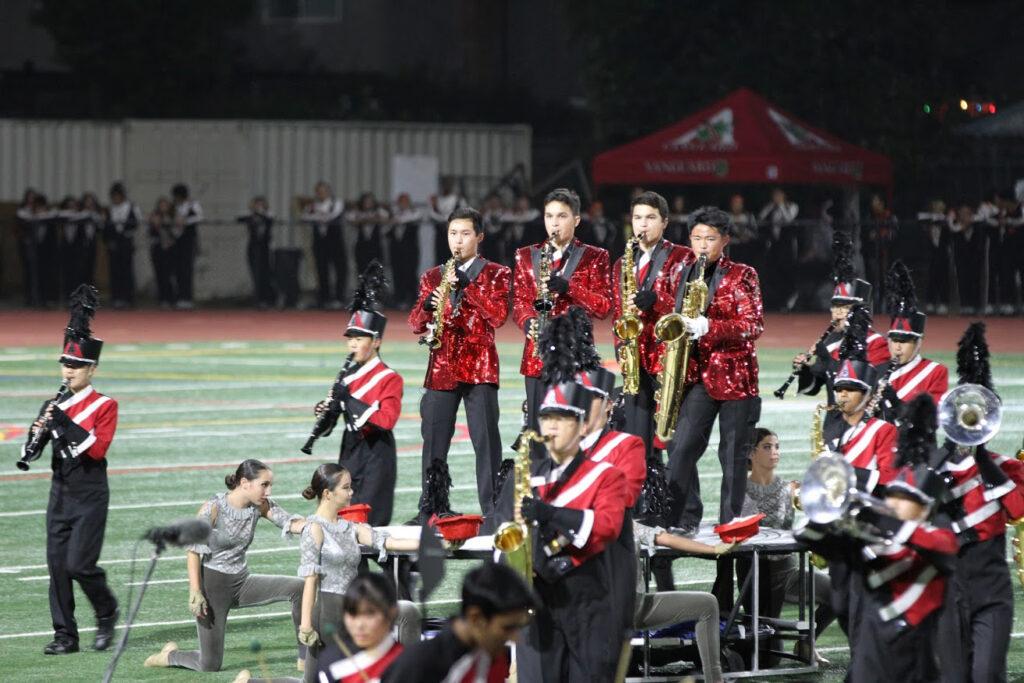This year’s marching band show, “Timeless,” conducted by drum majors junior Isaac Sun and seniors Alexander Mah, Sean Ryan and Joshua Yoon, represents the evolution of music through time. It includes a string quartet to portray classical music, as well as a saxophone quartet to represent more modern sounds, band director Jason Shiuan said.
The string quartet includes two violinists, juniors Avyay Koorapaty and junior Nikhil Nair; one violist, junior Panithi Kachinthorn; and one cellist, sophomore Maddie Jin. They are members from the school’s most advanced string ensemble, Saratoga Strings.
Last Saturday, the band performed in its first official competition, Cupertino Tournament of Bands at Cupertino High School. The band swept three of four of the major awards, winning first place for Field Show Sweepstakes (overall field show performance), first place for General Effect and tying with Homestead to win first for Best Marching.
During the show, the quartet performs a solo-esque movement at the beginning, then play a more supporting role as the performance continues and the saxophone ensemble takes the lead melody.
“The string instruments are kind of old and classical, so they start the whole show,” Shuian said. “[The genre of music] then evolves, and a saxophone quartet takes over as a different voice. At the end they kind of combine to show that even though they are old versus new, they still work well when they come together.”
The school’s marching band has featured string players in shows before. In 2014, the show “Sacred Geometry” included a string trio feature; however, the string musicians stood at the front of the field for the entire performance. In contrast, the quartet is stationed platforms that are moved around the field throughout the show this year, Jin said.
For the string players themselves, it is a new experience working with the marching band in this way. Jin, who was a member of the school’s winter guard last season, said that it has been a novel and enjoyable experience for her to play the cello with the band.
“It’s really cool to watch the performance from a different point of view,” Jin said. “I’ve never played a cello on a field before.”
Koorapaty, the first violinist of the quartet, played flute in the marching band during his freshman and sophomore years.
“There’s a lot of new and fun things about playing as a featured ensemble,” he said, “but there’s also some difficult things we’re working on.”
The main issue, Koorapaty said, is matching tempo with the band.
Members of the band are trained by teachers and band practice to prioritize strict and consistent tempo, Shuian said. In contrast, string players, who generally perform indoors and play more expressive repertoire, have more freedom in timing.
Another challenge is playing while on the moving platforms: learning to play from different places on the field.
“It’s challenging because they have get used to listening and timing out their playing differently,” Shuian said. “And then you have this added difficulty of being mic’ed.”
When the strings are playing, there is also a delay between actually playing and the mic feedback, which the quartet must accommodate, Shiuan said.
Rather than attending every marching band practice, which often focus on the band’s choreography, the quartet members rehearse individually without supervision.
Because the string quartet doesn’t have to do any marching, Shiuan said, it’s often unnecessary for them to attend rehearsals.
Despite these small complications and adjustments, the inclusion of a string quartet in year’s show has been a great learning experience for members of the band, Shiuan said.
The band will be participating in regional competitions every weekend for the upcoming three weeks. They will be at Dublin High School for the Irish Guard Invitational on Oct. 19, followed by the Foothill Band Review at Foothill High School on Oct. 26. Then they will head south to Fresno State University for the Fresno Sierra Cup on Nov. 2, wrapping up the competitive season.
“We’re very fortunate here, because the string program is so strong,” Shuian said. “That’s not true for all schools. For string players to be willing to be part of the show is a really unique opportunity to collaborate across genres.”
























